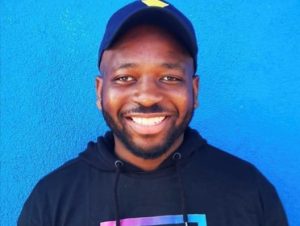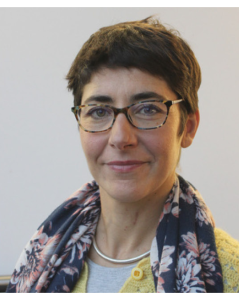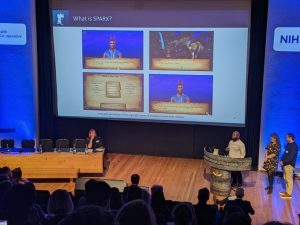Reflections on Young People’s Advisory Groups (YPAGs);payment, emotional labour, legitimacy and some take homes


By Stuart, member of Sprouting Minds Young Person’s Advisory Group and Elvira Perez Vallejos, Professor of Digital Technology for Mental Health at the University of Nottingham and Involvement Lead for the Digital Youth Programme.
Reflections on Young People’s Advisory Groups (YPAGs) ; payment, emotional labour, legitimacy and some take homes.
I’ve decided to do a blog about my highlights from being on Young People Advisory Groups (YPAGs) over the past few years, as I step into the 26–30 age bracket. There is always some anxiety around turning 25+ when you have been involved in YPAGs because there is little or no clarity on what happens after 25 (in the patient and public involvement world) – are there more / fewer opportunities for meaningful involvement after 25? and sometimes after spending years on a YPAG, it means losing contact with some peers – other people who understand your experience-and losing a couple of hours of paid work per month.
Losing a couple of hours of paid work per month came last on the list because I know most of the young people who get involved in this work don’t do it for the money and payment of lived experience contributors is a ‘tricky’ subject at any age. To me, payment has always made sense – it seemed like a straightforward thing; if everyone else in the room is getting paid for their time then why are the lived experience experts / advisors not getting paid or why was their payment tricky?
To those who chose to not get payment, it was mostly because of the impact it would have on their benefits. Sometimes no payment is offered and this, in my opinion, means that we only engage young people who can afford to participate without payment. No payment does not consider the socioeconomic disadvantage faced by marginalised groups such as young people from the LGBTQ+ community or ethnic minorities. By not offering payment, all you are doing is widening the gap between those that can afford to and those that cannot.
My first patient involvement experience wasn’t on a YPAG, it was on an adult group as a volunteer. I welcomed this because it provided insight into a part of the healthcare system which, if I hadn’t been a long-term patient, I wouldn’t have engaged much with. Over the next few years, I met and spoke to some people who had dedicated a lot of years to their lived experience work. This really influenced my perception of the work and its impact on the system and on self – which is an area I am still exploring.
Young People’s Advisory Groups (YPAGs) and emotional labour
Most YPAGs meet only 1-2 times per month for an hour or 2 and this is usually a conversation around a specific topic or a part of the study they have been recruited for.
There is some joy in knowing that your contribution(s) as part of a YPAG can influence a national policy and when research becomes more accessible globally, impact might be greater. It is also a good way to build confidence, connect with like-minded people, and the opportunity to explore different ways to talk about emotions or experiences. For example, I had never written about my experiences living with a physical diagnosis until this blog I wrote for the McPin Foundation. Some of the training offered on YPAGs included public speaking training, peer mentoring and graphic design. However, there is also some frustration caused by ‘push backs’ from the researchers (some which you never meet the whole time you’re on a YPAG) or repetitiveness of meeting agendas – That is not genuine co-production!
Co-production is a way of working where service providers and service users work together to reach a collective outcome. It means that projects or campaigns are co-designed and co-delivery with service users. This requires organisations and professionals to share power to create and implement actions rather than treating service users as passive recipients. – Mind & Involve
In most YPAGs, there’s no expectation to speak about any lived experience when reviewing work – but it was difficult to see how my contribution was ‘credible’ or ‘legitimate’ if I don’t include any personal experience. Being ‘authentic’, whilst on YPAGs, is often interpreted as ‘always sharing or oversharing experiences’ in every conversation. It can be assumed that most (if not all) contributions by the group to documents / workshops etc carries some degree of lived experience. We live with it, we carry it, we bring it & we share it. We hope in return it is listened to, respected, and leads to change.
Legitimacy of the work (my contribution) was also something I struggled with in the early stages of my YPAG journey. I had healthcare work experience and some certificates to cover my academic credentials. However, from my lived experience, I thought I had nothing. Questions I still have whilst typing this; how do lived experience contributors measure the legitimacy of their work? ‘What are researchers and health professionals’ opinions on the legitimacy of lived experience work?’ I have sat in conversations about how young people’s contributions to YPAGs can be recognised; ‘thank you letters’ and ‘certificates’ are the top two suggestions. The certificate conversation usually hits a brick wall when questions around ‘its recognition beyond the YPAG’ or ‘accreditation’ start coming up. In the future, could there be a ‘standardised’ certificate for YPAG involvement?
Payment is also linked to emotional labour of participation on YPAGs. Payment, in cash or vouchers, is an influencing factor when individuals struggle with questions around ‘whether it is worth it or not?’
Most young people are on multiple YPAGs – “The next one will be better” – I used to say to myself, or in the hope of gaining ‘different experience’ or to be more impactful. Personally, I have been there, especially at a point when I saw examples of good involvement. To me, joining multiple YPAGs meant increasing the reach of my experiences and the experiences of those young people who were not ready to speak about their experiences. However, now I measure my impact as; how many young people I can support on their involvement journey and how many seats I have held as a young person and, after I leave, will still be reserved for another young person. This has helped me cope with sustaining this work.
There is flexibility, being able to pull away when it gets too much, when on a YPAG. In addition to this, some YPAGs offer routine check-ins and wellness plans which are respected and followed. Patient and Public Engagement Coordinators, who usually lead the YPAG are sometimes mentors and influence careers into peer research.
During my time as a member of Sprouting Minds, I’ve been part of the young person’s advisory group for SPARX, one of the research projects on the Digital Youth Programme, working closely with Kareem & Camilla as well as researchers from other universities involved in the programme – SPARX is about building resilience through gameplay e-therapy (digital game) and equips young people with life skills to power through stressful and negative emotions.
Initially, I was nervous about joining the project; I haven’t picked up a gaming console in a few years and because the intervention (SPARX) is a digital game I assumed I would need to a ‘tech guru’ to meaningfully contribute to the conversations. However, the researchers and other members of the advisory group were very helpful in ensuring I realised my ‘value’; the insight I brought to the table from my lived experience of depression and ‘fresh insight’ as a non-gamer / not a tech guru. This experience / opportunity has also allowed to enhance my presentation skills – I presented SPARX at the Mindtech Symposium 2022 at the Royal College of Physicians in London, and build my network in digital youth research.
Take homes for young people:
- • Your well-being is more important than any research study
- • Your experiences are valid and valuable
- • You’re not being unreasonable when you ask for or expect more from being on a YPAG
- • There are some groups / organisations out there which are fighting for your corner!
Take homes for researchers or health professionals working with Young People:
- Lead researchers should meet all members of the YPAG
- Honesty from researchers / funders on the planned impact and influence of a YPAG before it is put together will help set expectations
- Experiences of being on YPAG need to be evaluated and learning to be implemented
- There should be investment in safeguarding procedures, engagement exercises and ensuring activities are meaningful before recruiting for a YPAG
- When young people join YPAGs, this might be their first time giving a shot to trusting ‘the system’ again and your interactions with them have a long-standing impact
- Incentives for participation on YPAGs should reflect the value of the young people’s lived experience. Living wage looks should be the base rate.
Response to Stuart’s blog from Professor Elvira Perez- Vallejos, Professor of Digital Technology for Mental Health at the University of Nottingham and Involvement Lead for the Digital Youth Programme.
Stuart’s blog made me reflect on the impact -both positive and negative- Digital Youth can have on members of its YPAG, aka Sprouting Minds. As Youth Lead, his blog reminds me of the responsibility we all carry to, not only support and safeguard each member of the YPAG, but to be a source of inspiration and positive force for change. It has never occurred to me before that Digital Youth can be perceived by Sprouting Minds as another part of ‘the system’, with its intrinsic hierarchies and power dynamics. Academia and higher education can be perceived as a place where young people, especially those struggling with their mental health, may feel they do not belong to. Is Digital Youth doing enough to break existing barriers, to dismantle stereotypes, and rigid preconceptions about what academia may mean to some young people?
Being aware and mindful of this important mentoring role is crucial to foster a culture of trust and provide opportunities for members of Sprouting Minds to initiate conversations about their aspirations, their future plans and how Digital Youth can influence decisions about career progression, becoming a researcher or even aspiring them to complete a PhD. However, for these conversations to be initiated, a trusting and safe relationship has to first emerge. As Youth Lead, Stuart’s blog reminds me that Digital Youth is also responsible for facilitating interactions that go beyond established limits and boundaries, where we are encouraged to show a personal interest about the aspirations and future plans of Sprouting Minds members. From writing a letter of recommendation to initiate an informal conversation to brainstorm possibilities about the future, there are plenty and significantly enriching experience Digital Youth could provide to Sprouting Minds.
On my to do list today I write ‘check that I have personally met all Sprouting Mind members, especially those that joined the YPAG after the co-production work we did to develop our successful funding application.
About the authors
Stuart is a member of Sprouting Minds, the Digital Youth young person’s advisory group and. He has been working with our researchers on the design and development of a serious online game for young people with depression. This blog expresses the personal views and lived experience of Stuart, and does not represent the opinion of Sprouting Minds or the UKRI Digital Youth Programme. If you were affected by this blog and would like to seek advice and support around issues it raised you can contact the following links:
https://www.youngminds.org.uk/
Elvira Perez- Vallejos is a Professor of Digital Technology for Mental Health at the University of Nottingham and Involvement Lead for the Digital Youth Programme. She is interested in the ethical challenges embedded in digital solutions for mental health including the widespread of machine learning/AI methods on the development of new mental health interventions. She has experience on RRI (Responsible Research and Innovation) and Data Ethics as well as on Data Privacy, Online Consent, User-centric design, Creative Practices for Mutual Recovery, Experimental Psychology, Participatory research, Children and Young People, and Older Adults. @Elvira_PV


